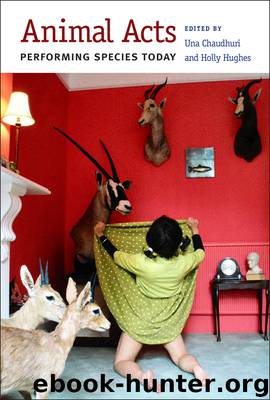Animal Acts: Performing Species Today by Una Chaudhuri & Holly Hughes

Author:Una Chaudhuri & Holly Hughes
Language: eng
Format: epub
Publisher: The University of Michigan Press
Published: 2018-05-15T00:00:00+00:00
Both Pony Club and the riding program at Madeira were geared toward three-day eventing because it is considered the complete test of horse and rider, but working with Mike took my riding, my understanding of the relationship with horses, and the conditioning of horses as equine athletes to much more advanced levels. In three-day eventing, you need a horse who is obedient enough to do the dressage test, requiring precision and suppleness in a small arena on the first day, yet fit and brave enough to gallop for miles of cross-country jumping over imposing obstacles on the second day, and still sound enough to clear a course of show jumps in an arena on the third day. With origins in cavalry training, the sport was still male dominated in the 1970s, but that was changing. In the Olympic Games, equestrian sports are one of the very few where men and women compete on equal footing in the same events, as do male and female horses. Even before I had had much intellectual exposure to feminism, I was entering a world where women quite literally were doing what men could do, even physically, and often doing it better. And that knowledge of equality was coming through the body.
I worked with Mike during the summers until I graduated from high Page 125 → school, deferred college matriculation for a year to ride and compete, attended college for two quarters, and then took a leave for another two and half years to train with him full-time with the National Velvet dream of making the 1980 Olympic team. When Max died in 1972, at the beginning of that odyssey, most of his fortune went into a foundation dedicated to various Canadian causes, but my mother inherited enough to keep a smaller-scale thoroughbred breeding operation going in Pennsylvania for about fifteen years and to buy several top event horse prospects for me and Mike to ride.
(Remove eyeglasses, cross to brush box by horse.) During the two and a half years I was training full time, it was total immersion. I was one of three working students. We worked for Mike in the mornings, mucking out the barn, grooming the eight or nine horses he had in training before and after he rode them each day. I still use this trophy brush box that I won at a show for the job I did taking care of one of the horses assigned to me. In exchange, he gave us lessons on our own horses, whom we also took care of, in the afternoons and evenings. The schedule was grueling. We started at 5:00 a.m. and often weren't finished putting away our own horses until 9:00 at night. We worked seven days a week; there are no days off with horses.
(Sitting on the edge of the stage close to the audience.) It was in the middle of this intensity that, like my mother and grandmother before me, I had my own scarring, life-altering experience of the dangers of working around horses.
Download
This site does not store any files on its server. We only index and link to content provided by other sites. Please contact the content providers to delete copyright contents if any and email us, we'll remove relevant links or contents immediately.
| Anatomy | Animals |
| Bacteriology | Biochemistry |
| Bioelectricity | Bioinformatics |
| Biology | Biophysics |
| Biotechnology | Botany |
| Ecology | Genetics |
| Paleontology | Plants |
| Taxonomic Classification | Zoology |
Sapiens: A Brief History of Humankind by Yuval Noah Harari(14371)
The Tidewater Tales by John Barth(12653)
Mastermind: How to Think Like Sherlock Holmes by Maria Konnikova(7325)
Do No Harm Stories of Life, Death and Brain Surgery by Henry Marsh(6938)
The Thirst by Nesbo Jo(6934)
Why We Sleep: Unlocking the Power of Sleep and Dreams by Matthew Walker(6707)
Life 3.0: Being Human in the Age of Artificial Intelligence by Tegmark Max(5551)
Sapiens by Yuval Noah Harari(5366)
The Body: A Guide for Occupants by Bill Bryson(5082)
The Longevity Diet by Valter Longo(5059)
The Rules Do Not Apply by Ariel Levy(4957)
The Immortal Life of Henrietta Lacks by Rebecca Skloot(4581)
Animal Frequency by Melissa Alvarez(4465)
Why We Sleep by Matthew Walker(4435)
The Hacking of the American Mind by Robert H. Lustig(4375)
Yoga Anatomy by Kaminoff Leslie(4359)
All Creatures Great and Small by James Herriot(4311)
Double Down (Diary of a Wimpy Kid Book 11) by Jeff Kinney(4261)
Embedded Programming with Modern C++ Cookbook by Igor Viarheichyk(4175)
